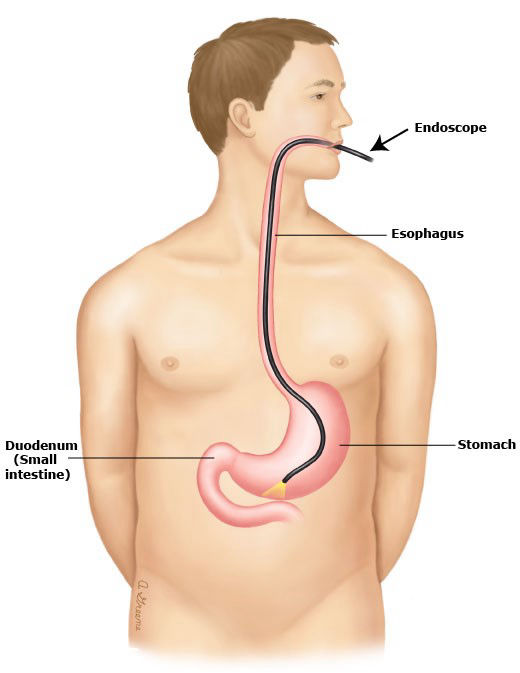

A gastroscopy is a test to examine the lining of your upper digestive tract. The upper digestive tract includes the oesophagus (the tube which connects the mouth and stomach), the stomach, and the duodenum (the first part of the small intestine).
You might have an upper endoscopy if you have:
• Pain in your upper abdomen (dyspepsia)
• Heartburn (gastro-oesophageal reflux)
• Nausea and vomiting
• Diarrhoea
• Trouble swallowing, or a feeling of food getting stuck in your throat (dysphagia)
• A low blood count (anaemia) from iron deficiency
We will ask you not to eat or drink anything for up to eight hours before the test. It is important for your stomach to be empty to allow clear visualisation and to reduce the risk of food or fluid being breathed into the lungs while under sedation (aspiration).
We may ask you to stop some specific medications before the examination.

You will be given medications through an intravenous line (a needle placed in a vein in the hand or arm) to make you feel relaxed and help you to sleep through the procedure. You may also be given a throat spray to temporarily numb the back of your throat, and a mouth guard will be put in your mouth to help protect your teeth from damage. The medication will be given by an Anaesthetist who will be monitoring your vital signs (blood pressure, heart rate, oxygen saturations and level consciousness) throughout.
The endoscopist will gently pass a thin tube with a tiny camera and light on the end into your mouth and steer it to the duodenum.
During the procedure we might take a small sample of tissue from the upper digestive tract (a biopsy) to be examined under a microscope. The lining is not pain-sensitive so you will not feel it if biopsies are taken.
After the gastroscopy, you will be monitored for 1 to 2 hours in the recovery area until the anaesthetic medicines wear off. You will be given something to eat and drink. We will see you in recovery and discuss with you the findings of the procedure and the next steps.
You won’t be able to drive for the rest of the day after your procedure, so it is important to have someone who can pick you up and take you home. If this is not possible, let us know in advance and we can arrange alternatives for you. Most people can drive and go back to work the following day.
We will tell you when to start taking any medicines we asked you to stop before the test.
Gastroscopy is a safe procedure, and complications are rare but can occur:
• Inhalation of food or fluids into the lungs (aspiration)
• Bleeding can occur from biopsies, but it is usually minimal and stops quickly on its own.
• The gastroscope can cause a tear or hole in the oesophagus, stomach or duodenum (perforation). This is a serious problem that sometimes requires surgery to repair, but is a very rare complication.
Copyright
Ana Braithwaite 2022